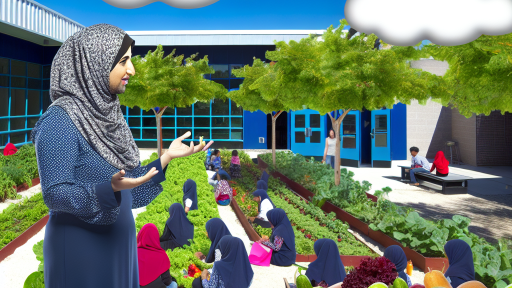Introduction to Ethical Farming
Definition of Ethical Farming
Ethical farming involves practices that prioritize environmental sustainability and animal welfare.
It focuses on reducing harm to ecosystems and promoting biodiversity.
Farmers engage in practices that ensure a fair treatment of workers and livestock.
Moreover, these methods aim to eliminate the use of harmful chemicals and pesticides.
Principles of Ethical Farming
One principle emphasizes the importance of soil health.
Healthy soil leads to nutritious crops and reduces erosion.
Additionally, ethical farming promotes crop rotation and polyculture.
This diversity enhances resilience against pests and diseases.
Another important principle is animal welfare.
Ethical farmers provide humane living conditions for their livestock.
This includes ample space, proper nutrition, and medical care.
Furthermore, they avoid practices that cause unnecessary suffering.
Community involvement is also a key principle.
Farmers engage with local communities to support food security.
They often participate in educational programs and local food systems.
Transform Your Agribusiness
Unlock your farm's potential with expert advice tailored to your needs. Get actionable steps that drive real results.
Get StartedIn doing so, they enhance the overall well-being of their communities.
Environmental Benefits of Ethical Farming Methods
Enhancing Biodiversity
Ethical farming enhances biodiversity on farms.
This practice creates habitats for various wildlife species.
Moreover, it encourages the growth of native plants.
Farmers can use crop rotations to improve soil health.
Ultimately, this leads to a more resilient ecosystem.
Soil Health Improvements
Healthy soil is a cornerstone of ethical farming.
These methods improve soil structure and nutrient content.
Beneficial microorganisms thrive in healthier soils.
They play a vital role in nutrient cycling and plant growth.
Additionally, ethical practices reduce soil erosion.
Water Conservation
Ethical farming methods prioritize water conservation.
Farmers often employ techniques like drip irrigation.
These techniques minimize water wastage significantly.
Moreover, planting cover crops prevents runoff and erosion.
This ensures clean water sources for surrounding communities.
Reduction of Chemical Use
Minimizing chemical use is critical in ethical farming.
Farmers implement natural pest control methods instead.
This reduces pollution and chemical residues in the environment.
Organic fertilizers promote healthier soils and ecosystems.
As a result, ethical farming promotes a healthier planet.
Impact on Soil Health and Biodiversity
Enhancing Soil Health
Ethical farming methods significantly improve soil health.
They promote the use of organic materials and cover crops.
This practice enriches soil fertility over time.
Showcase Your Farming Business
Publish your professional farming services profile on our blog for a one-time fee of $200 and reach a dedicated audience of farmers and agribusiness owners.
Publish Your ProfileHealthy soil retains moisture better, reducing water needs.
Moreover, it helps prevent soil erosion and degradation.
Boosting Biodiversity
These farming methods support a diverse ecosystem.
They create habitats for various organisms and insects.
Increased biodiversity leads to a natural pest control system.
This, in turn, reduces the need for chemical pesticides.
Ultimately, a rich biodiversity improves crop resilience.
Promoting Sustainable Practices
Ethical farming encourages sustainable practices across the board.
Crop rotation and intercropping maintain soil nutrients.
These techniques help manage pest populations naturally.
Farmers contribute positively to the local environment.
Additionally, these practices support the balance of ecosystems.
Community and Economic Benefits
Ethical farming fosters a sense of community among farmers.
Sharing knowledge improves farming techniques for everyone.
This enhances local economies by offering diversified crops.
Consumers benefit from healthier, fresher food options.
Ultimately, ethical farming creates a sustainable model for future generations.
Learn More: Direct Sales vs. Traditional Distribution for Farmers
Enhanced Animal Welfare in Ethical Farming Practices
Understanding Animal Welfare
Animal welfare focuses on the well-being of farm animals.
Ethical farming prioritizes their health and comfort.
Healthy animals contribute to sustainable farming systems.
Improved Living Conditions
Ethical farming ensures spacious, clean living environments.
Animals enjoy access to the outdoors and natural light.
These conditions reduce stress and promote healthy behaviors.
Better Nutrition and Care
Farmers practicing ethical methods provide high-quality feed.
Proper nutrition supports growth and general health.
Moreover, ethical farmers prioritize regular veterinary care.
Positive Impact on Animal Behavior
Ethical practices allow animals to exhibit natural behaviors.
For instance, chickens can roam and forage freely.
This freedom leads to happier, healthier animals.
Minimized Suffering
Ethical farming actively works to minimize animal suffering.
Farmers implement humane handling and transportation methods.
This ensures that stress and injuries are kept to a minimum.
Consumer Awareness and Demand
As consumers become more aware, they demand ethically produced products.
This shift encourages more farmers to adopt ethical practices.
Ultimately, this enhances the overall welfare of farm animals.
Delve into the Subject: Challenges in Direct-to-Consumer Farming Sales
Economic Advantages
Supporting Local Economies
Ethical farming methods significantly bolster local economies.
They enable farmers to retain a larger portion of their earnings.
This creates a ripple effect that benefits surrounding communities.
Showcase Your Farming Business
Publish your professional farming services profile on our blog for a one-time fee of $200 and reach a dedicated audience of farmers and agribusiness owners.
Publish Your ProfileLocal farmers are more likely to purchase supplies from nearby businesses.
This practice strengthens local supply chains and job markets.
Boosting Market Opportunities
By focusing on ethical practices, farmers attract conscientious consumers.
These customers often seek out fresh, sustainably sourced products.
This trend creates new market opportunities for ethical producers.
Farmers can sell directly to consumers at farmers’ markets or through Community Supported Agriculture (CSA) programs.
Enhancing Product Value
Ethical farming often leads to higher-quality products.
Consumers are willing to pay premium prices for organic and ethically sourced goods.
This increases the profitability for local farmers.
Moreover, it encourages sustainable practices that can be economically beneficial.
Stabilizing Local Food Systems
Ethical farming contributes to the stability of local food systems.
It reduces dependence on large, industrialized agricultural systems.
By focusing on local production, communities can better withstand economic fluctuations.
This independence enhances food security and community resilience.
Delve into the Subject: Impact of CSA on Local Farming Communities
Consumer Preferences
Growing Demand for Ethically Sourced Products
Consumer preferences are shifting towards ethically sourced products.
In recent years, buyers have shown a strong interest in sustainability.
This trend is evident in various sectors, including food and fashion.
Shoppers actively seek out brands that align with their values.
Consequently, many companies are adapting their practices to meet this demand.
Ethical farming methods are now more visible in retail markets.
Consumers appreciate transparency about sourcing and production processes.
Many are willing to pay a premium for ethically produced goods.
This willingness has led to increased sales for ethical brands.
Moreover, social media plays a significant role in shaping consumer opinions.
Online platforms allow consumers to share their preferences easily.
This amplifies demand for ethically sourced products across demographics.
Notably, younger generations prioritize sustainability in their purchases.
Companies are responding by highlighting their ethical commitments.
This shift fosters a competitive advantage in crowded markets.
Additionally, ethical farming practices contribute to positive environmental impacts.
As a result, consumers are not just buying products; they are supporting a movement.
The growing demand for these products reflects broader societal changes.
Ultimately, ethical farming meets both consumer desires and global challenges.
See Related Content: Seasonal Eating Practices for Farm-to-Table Farmers

Mitigation of Climate Change through Sustainable Practices
Reducing Greenhouse Gas Emissions
Sustainable farming significantly reduces greenhouse gas emissions.
This reduction happens through efficient use of fertilizers.
Additionally, practices such as cover cropping enhance soil health.
Moreover, these practices help sequester carbon in the soil.
Farmers like Liam Peterson have adopted these techniques successfully.
Showcase Your Farming Business
Publish your professional farming services profile on our blog for a one-time fee of $200 and reach a dedicated audience of farmers and agribusiness owners.
Publish Your ProfileEnhancing Soil Health
Healthy soil plays a crucial role in climate resilience.
It improves water retention and decreases erosion.
Practices such as crop rotation and mulching are effective methods.
These techniques increase microbial activity and nutrient cycling.
Consequently, they bolster plant growth and reduce chemical dependency.
Promoting Biodiversity
Biodiverse farming systems are more resilient to climate change.
They provide habitats for beneficial insects and wildlife.
Diverse crops can withstand pests and diseases better.
Also, practices like agroforestry contribute to ecosystem stability.
Farmers like Maria Gonzalez cultivate multiple crops to enhance biodiversity.
Water Management Improvements
Sustainable practices lead to better water management.
They promote rainwater harvesting and efficient irrigation systems.
Such systems reduce dependency on groundwater sources.
Additionally, they help in mitigating flood risks during heavy rains.
This approach conserves water and supports overall farm productivity.
Community Engagement and Education
Farmers can engage communities in sustainable practices effectively.
Education helps communities understand the importance of sustainability.
Workshops and demonstrations foster knowledge sharing among farmers.
Moreover, local initiatives like farmer cooperatives enhance collaboration.
These efforts create a supportive environment for sustainable farming.
Challenges and Barriers to Adopting Ethical Farming Methods
Financial Constraints
Adopting ethical farming methods often requires significant financial investment.
Many farmers face tight budgets that limit their ability to make changes.
Initial costs for equipment and organic seeds can be prohibitive.
Additionally, farmers may struggle to access loans for sustainable practices.
Knowledge Gaps
Many farmers lack training in ethical farming practices.
Without proper education, they may find it challenging to implement new methods.
Access to resources on sustainable practices can be limited.
Furthermore, outdated agricultural education may not address modern challenges.
Market Pressures
Farmers often experience pressure to maintain high output levels.
This pressure can discourage them from exploring ethical practices.
Additionally, market demand for low-cost food further complicates the situation.
Consequently, many farmers hesitate to invest in ethical farming methods.
Cultural and Community Attitudes
Cultural attitudes toward farming can influence willingness to adopt new methods.
In some communities, traditional farming practices are deeply rooted.
Farmers may fear losing community support if they diverge from these practices.
Moreover, misinformation about ethical farming can create resistance.
Regulatory Hurdles
Complex regulations can pose significant barriers to ethical farming.
Farmers may face challenges in navigating legal requirements for organic certification.
Compliance with health and safety standards can be overwhelming.
Inconsistencies in regulations across regions can create confusion.
Showcase Your Farming Business
Publish your professional farming services profile on our blog for a one-time fee of $200 and reach a dedicated audience of farmers and agribusiness owners.
Publish Your ProfileAccess to Infrastructure
Many farmers lack access to necessary infrastructure for ethical farming.
This includes facilities for processing organic products or sustainable transport options.
Rural areas, in particular, may face significant logistical challenges.
Without adequate infrastructure, transitioning becomes impractical.
Future Trends in Ethical Farming
Innovative Technologies
Advancements in technology drive ethical farming into new territories.
Smart farming solutions utilize data analytics for better decision-making.
Automated systems enhance efficiency and reduce human labor costs.
Moreover, vertical farming techniques optimize space and resource use.
Sustainable Practices
More farmers are adopting regenerative agriculture practices.
This method replenishes soil and promotes biodiversity.
Additionally, organic farming continues to grow in popularity.
Consumers increasingly seek products that are grown sustainably.
Local Food Systems
Community-supported agriculture (CSA) connects local farmers with consumers.
This model enhances food freshness and reduces transportation emissions.
Furthermore, urban farming initiatives are gaining momentum.
Cities are looking for ways to produce food sustainably within their boundaries.
Government Policies and Support
Policies are emerging to promote ethical farming practices.
Subsidies encourage farmers to transition to more sustainable methods.
Public awareness campaigns educate consumers about ethical choices.
Consequently, demand for ethically produced food continues to rise.
Consumer Empowerment
Consumers are increasingly aware of their food sources.
They demand transparency in food production processes.
Online platforms allow consumers to connect directly with farmers.
This trend encourages farmers to embrace ethical standards.
Additional Resources
How Farm-to-Table Practices are Changing the Way We Think …
Leading the Farm to Table Movement in Greenville SC – Farm to …




